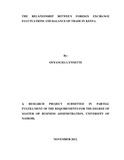| dc.description.abstract | The opening of many bilateral and multilateral trade agreements, the foreign exchange rate has become a very important factor in Kenya’s economy. The country deals with international trade where it involves itself in importing of expatriates, exporting of skills, importation of essential commodities for domestic and industrial consumption and exportation of agricultural and industrial produce. Fluctuations in the exchange rate of a country currency have always had its effect on the balance of trade. Kenya’s economic performance heavily relies on exports and imports both of which determine the balance of trade. The research explored the relationship between foreign exchange rate fluctuations and the balance of trade in a setting that will tend to avoid the shortcomings of earlier literature.
The researcher used descriptive research design to describe the relationship between foreign exchange. The study utilized secondary data on an annual basis between the periods of January 2007 to December 2011. Data on Foreign exchange rates was obtained from CBK reports while data on balance of trade was obtained from the Kenya Bureau of Statistics. For further analysis, regression method was used to determine the significance of the contribution of the specific variables to import and export volumes. Coded data was then be tabulated in Statistical package for Social Science (SPSS version 16.0). The value in foreign exchange terms of total export and import of goods were used to obtain the balance of trade, which is defined as ratio of import over export.
It was found out that there is a long run relationship between balance of trade, exchange rate, foreign and domestic GNP. The domestic output growth leads to increase in exports but no significant impact on imports is shown. More research is needed to determine why the impact on imports is small, the effect of exchange rate fluctuation on foreign direct investment and extent of fluctuation on inflation. The authorities should intervene on the foreign exchange policies by regulating the hybrid system, devaluing the currency when exports are on high demand. Since the impact of the exchange rate adjustment on trade balance is ambiguous given the absence of a more stable long run relationship, it is advisable to rely on currency appreciation in order to correct trade surplus. | en_US |

